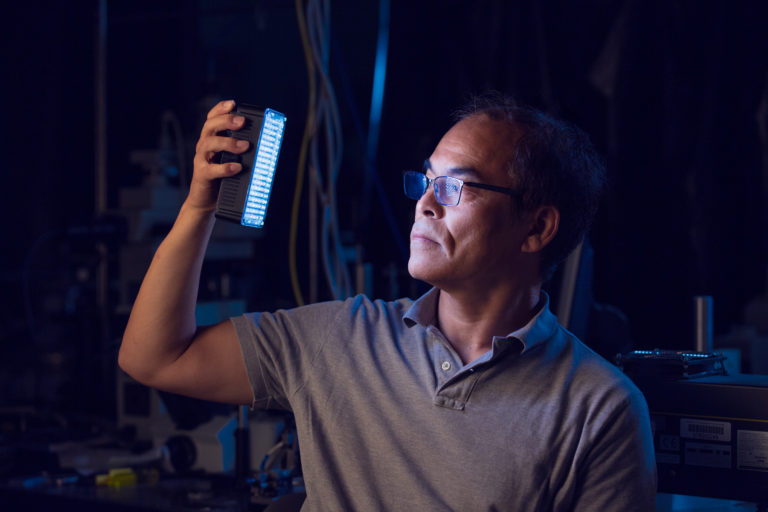
Eddie Lo
Contributing Writer
Photo by Matt Perko
On April 26, the 2020 National Academy of Science (NAS) Award for the Industrial Application of Science was awarded to Shuji Nakamura, a professor in the department of materials at UC Santa Barbara (UCSB).
This year’s award was meant to highlight achievements in the field of sustainability. The triennial award honored Nakamura for his “pioneering discoveries, synthesis and commercial development of gallium nitride LEDs [light-emitting diodes] and their use in sustainable solid state light sources, which are reducing global greenhouse gas emissions while also reducing cost to those adopting this technology,” said NAS President Marcia McNutt.
Nakamura said it was a great honor to receive the award and went on to thank the support of Chancellor Henry T. Yang as well as faculty and staff at UCSB.
“LED light bulbs are more than 10 times more efficient than conventional incandescent light bulbs, and they last for 50 years. At their current adoption rate, by 2020, LEDs could reduce the world’s need for electricity by the equivalent of nearly 60 nuclear power plants,” Nakamura said.
Nakamura invented high energy efficient blue LEDs while working at the Japanese company Nichia Corporation in 1992. Although red and green LEDs had been around for many years, blue LEDs were the last piece of the puzzle needed to produce white light. He experimented on gallium nitride, which at the time was hard to produce, and eventually created the high brightness gallium nitride (GaN) blue LED lights. A year later, he and Nichia worked together to begin mass producing the world’s first white LED lights.
His discoveries led to a LED lighting revolution in the following decades, and LEDs are now commonly used in smartphones, computers, and TV displays, as well as various kinds of lighting. Nakamura, along with engineers Isamu Akasaki and Hiroshi Amano, received the 2014 Nobel Prize in physics for their work on blue LEDs.
In 2000, Nakamura was hired at UCSB and is now the director of the Solid State Lighting & Energy Electronics Center.
In an interview with The Bottom Line (TBL), Nakamura said he has continued his research on LEDs in hopes of making them even more energy efficient. Nakamura has also continued his research on blue laser diodes (which he invented in 1995), and leads Soraa Laser Diode — a company he co-founded — in developing Li-Fi, a laser communication technology many times faster than 5G and 100 times faster than WiFi that has a wide range of applications including data transmission in self-driving cars.
Nakamura told TBL that he is currently developing ultraviolet (UVC) LED lights, a technology commonly used to disinfect surfaces and kill bacteria; his research has been ongoing for years at UCSB, but it recently gained a lot of attention due to the pandemic.
“You get all kinds of phone calls from all over the world right now about UVC research,” said Nakamura.
Nakamura’s UVC LED lights have a targeted wavelength of 280 nm, capable of killing most bacteria and viruses, including COVID-19. The technology is effective in sterilizing objects such as personal protective equipment, but it is still not safe on humans, at least for now. Labs all over the world are now researching the technology, and he remains optimistic of its future, “I think UVC LED is the best way to [fight] against all kinds of viruses,” said Nakamura.
Nakamura has also received numerous awards for his work, including the Nishina Memorial Prize, Benjamin Franklin Medal Award, Materials Research Society Medal Award, Global Energy Prize, and many more.
He is a fellow of the National Academy of Engineering and the National Academy of Inventors, and holds more than 200 U.S. patents and more than 175 Japanese patents.










